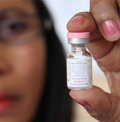 The proportion of people receiving their third dose of the diphtheria-tetanus-pertussis vaccine (DTP3) hit a new high of 85% in 2010, according to figure published in the CDC’s Morbidity and Mortality Weekly Report (MMWR).
The proportion of people receiving their third dose of the diphtheria-tetanus-pertussis vaccine (DTP3) hit a new high of 85% in 2010, according to figure published in the CDC’s Morbidity and Mortality Weekly Report (MMWR).
Three countries – India, Nigeria, and the Democratic Republic of Congo – accounted for around half of the 19.3 million children who had not received DTP3 during the first year of life.
Coverage with the other routinely recommended childhood vaccines was 90% for Bacille Calmette-Guérin (BCG) vaccine, 86% for the third dose of poliovirus vaccine, 85% for measles-containing vaccine, 75% for the third dose of hepatitis B vaccine, and 42% for the third dose of Haemophilus influenzae type b vaccine.
The World Health Organisations’s Expanded Program on Immunization was established in 1974 in an effort to tackle six preventable illnesses: TB, polio, diphtheria, tetanus, pertussis and measles.
Back then, fewer than 5% of the world’s infants were fully immunised but this had soared to 79% by 2005 and has risen further since.
The news comes as public health authorities in Europe fret about rising measles rates and patchy flu vaccination coverage in the developed world.
It may also be a sign that ongoing efforts by governments, international organisations and NGOs to boost vaccination coverage are having some impact.
Read: UN launches new coalition to boost vaccines access
However, many children still do not receive all recommended childhood immunisations due to a combination of funding shortfalls and poor health system managers.
The battle to eradicate polio has proven stubbornly difficult, although a concerted effort is being made by a broad coalition of global players.
The report points to recent initiatives by The Bill & Melinda Gates Foundation, the UN, WHO and others which gives cause for optimism that diseases like polio and measles could be consigned to history.





VaccinesToday (@VaccinesToday) (@VaccinesToday) (@VaccinesToday)
November 28th, 2011
Interesting to see global #vaccine coverage on the rise as developed world sees return of #measles http://t.co/zt8Jsm6o via @vaccinestoday